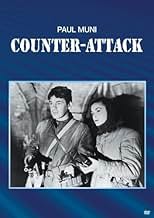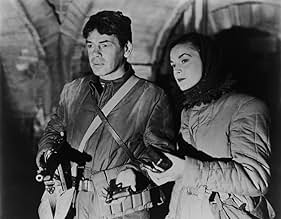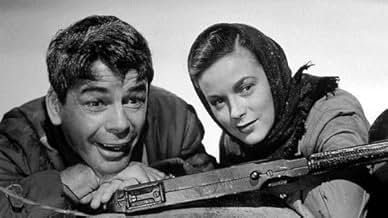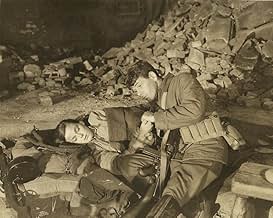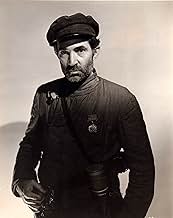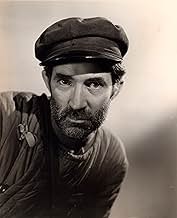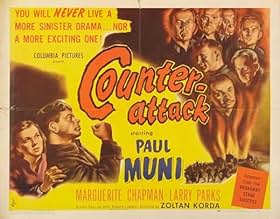VALUTAZIONE IMDb
6,8/10
583
LA TUA VALUTAZIONE
Aggiungi una trama nella tua linguaDuring WW2, a Mexican stand-off ensues between a group of German soldiers and a team of Soviet fighters trapped together in the basement of a bombed-out Russian building.During WW2, a Mexican stand-off ensues between a group of German soldiers and a team of Soviet fighters trapped together in the basement of a bombed-out Russian building.During WW2, a Mexican stand-off ensues between a group of German soldiers and a team of Soviet fighters trapped together in the basement of a bombed-out Russian building.
- Regia
- Sceneggiatura
- Star
Wolfgang Zilzer
- Krafft
- (as Paul Andor)
Louis V. Arco
- German Colonel
- (non citato nei titoli originali)
John Bagni
- Paratrooper
- (non citato nei titoli originali)
Trevor Bardette
- Petrov
- (non citato nei titoli originali)
Richard Bartell
- Ostrovski's Assistant
- (non citato nei titoli originali)
Recensioni in evidenza
After the fall of the Soviet Union in 1991, East European sources began putting World War II stories on film. And, some movies that had been made since the 1970s were being released in the West. As a result, most people in the West for the first time saw the contributions Russia had made to help win the war. These films tell stories about the war on the Eastern Front, and the ravages of war on those countries and their people. But there were some movies made much earlier in Hollywood about Russia's fighting Germany. Americans living during World War II would have seen those films. They were produced to show Americans the heroic efforts of the Russians as allies in WW II, and to win public support for the U.S. programs to supply arms and weaponry to Russia.
But, unlike other movies produced during the war years, the films on Russia's conflicts with the Germans were not shown as reruns in theaters or on TV beginning in the 1950s. No sooner had the war ended, when Joe Stalin began his power grab to control and enslave many eastern European countries and to oppress and murder his own people. Thus, the former ally in war was now an enemy in peace and a threat to western democracy. So, reruns of wartime propaganda films about the freedom-fighting Russians would conflict with the news of the day and the horrors reported on the Soviet oppression. The Cold War was on.
But now the Cold War is more than two decades behind us. With modern technology we can transfer movies from film to DVDs. And, so older films too are now available. One of the best of those is "Counter-Attack," starring Paul Muni. The movie came out in 1945 and is based on a play that ran on Broadway in 1943. A very strong point of the film is that it doesn't portray German soldiers or Russians as buffoons or as ignorant. Indeed, the dialog of the Russians in the early scenes, and of Muni throughout the film, is of intelligent, discerning individuals. While the Germans are the enemy here, none of those individuals portrayed is seen as uneducated. They do come across as menacing and clever.
The plot is excellent, and the directing and cinematography are exceptional. Muni plays his role perfectly, and several of the Germans are very good. This is a good propaganda film that put a WW II ally in good standing with Americans. If all Russians were like Muni and the rest of his special unit, we knew we had a competent, tough and capable ally. One worth fighting for and with. This movie is a welcome addition to my WW II film library.
But, unlike other movies produced during the war years, the films on Russia's conflicts with the Germans were not shown as reruns in theaters or on TV beginning in the 1950s. No sooner had the war ended, when Joe Stalin began his power grab to control and enslave many eastern European countries and to oppress and murder his own people. Thus, the former ally in war was now an enemy in peace and a threat to western democracy. So, reruns of wartime propaganda films about the freedom-fighting Russians would conflict with the news of the day and the horrors reported on the Soviet oppression. The Cold War was on.
But now the Cold War is more than two decades behind us. With modern technology we can transfer movies from film to DVDs. And, so older films too are now available. One of the best of those is "Counter-Attack," starring Paul Muni. The movie came out in 1945 and is based on a play that ran on Broadway in 1943. A very strong point of the film is that it doesn't portray German soldiers or Russians as buffoons or as ignorant. Indeed, the dialog of the Russians in the early scenes, and of Muni throughout the film, is of intelligent, discerning individuals. While the Germans are the enemy here, none of those individuals portrayed is seen as uneducated. They do come across as menacing and clever.
The plot is excellent, and the directing and cinematography are exceptional. Muni plays his role perfectly, and several of the Germans are very good. This is a good propaganda film that put a WW II ally in good standing with Americans. If all Russians were like Muni and the rest of his special unit, we knew we had a competent, tough and capable ally. One worth fighting for and with. This movie is a welcome addition to my WW II film library.
I was 7 years old when I saw this movie in 1945. the war swirled around me and this was a movie about success against an enemy of America. At 7, you have no political insights as to what is going on. It's the "good guys vs. the bad guys", the "cowboys vs. the indians" from a little kids perspective, and I was for the good guys, which in this case were the Russians. I guess it was OK to root for the Russians as long as we had a common enemy. This was my first exposure to propaganda movies, but not my last. When Paul Muni and Larry parks were identified as "Commie supporters" after the war was over, they paid a price for what they believed in. With the Communist conspiracy lurking, this hysteria impacted and destroyed a lot of people, a sad day for our country. Obviously, this movie made an impact on me, as it still is one of my favorites, all politics aside. From a historical perspective, it showed, that the Russians weren't always our enemies, a fact we would rather not acknowledge today. I guess it will always hold true, that "the enemy of my enemy, is my friend".
Recently saw this movie on TCM. Very powerful. It concerns a Russian soldier (Paul Muni) and a female resistance agent (well played by Marguerite Chapman, who I'm not familiar with) trapped in a bombed factory (?) with seven Germans. The director has some better known films, including "Four Feathers." Muni is well known. The others appear to be character actors.
It becomes a battle of wills, most of the action taking place in a condensed space -- the small area they are trapped in. But, meanwhile, we also get some excellent shots of the happenings outside in the battlefield and thereabouts. These add a nice touch to the movie, realistically so as well (a sort of newsreel feel in some cases).
The movie has a 1945 publication date but is played basically straight. It is always interesting as well when Russians are the good guys.
It becomes a battle of wills, most of the action taking place in a condensed space -- the small area they are trapped in. But, meanwhile, we also get some excellent shots of the happenings outside in the battlefield and thereabouts. These add a nice touch to the movie, realistically so as well (a sort of newsreel feel in some cases).
The movie has a 1945 publication date but is played basically straight. It is always interesting as well when Russians are the good guys.
An engrossing WW2 film set somewhere on the Russian Front with Paul Muni as a member of a Russian assault team who is trapped in a collapsed building with seven German soldiers, one of whom is an officer. Along with him is Margarithe Chapman as a Russian partisan. His character is in the lead part of a big Russian counter-attack that is to be launched across a river on a bridge that's being built eighteen inches under the surface of the water. The setting in the collapsed building with the German soldiers whom he has captured and is trying to extract information from is beautifully done with tension and humor amidst fading light, all captured by cinematographer James Wong Howe, one of the greats of B&W photography (and color, too if you've seen Picnic). Maybe Muni was a tad bit better in I Am A Fugitive From A Chain Gang, but he's awfully good here as a crafty Russian fighting sleep deprivation and fading light. The Germans are great as well, each getting enough lines to establish himself. Margarithe Chapman's part as Muni's comrade captures the idea of equality in the ranks among men and women. She's tough but tender.
An astringent war film atmospherically shot by Oscar-winning cameraman James Wong Howe with an attention to detail it doubtless owes to its stage origins.
As befits a film scripted by one of the Hollywood Ten, one of the Russians is a noble-looking young woman with a rifle, while the Nazis are an even more than usually devious and shifty bunch. One of the shiftiest is 'the Professor', played by Ludwig Donath, who ironically twice played fellow cast-member Larry Parks' father Cantor Yoelson before they both joined screenwriter John Howard Lawson on the blacklist.
As befits a film scripted by one of the Hollywood Ten, one of the Russians is a noble-looking young woman with a rifle, while the Nazis are an even more than usually devious and shifty bunch. One of the shiftiest is 'the Professor', played by Ludwig Donath, who ironically twice played fellow cast-member Larry Parks' father Cantor Yoelson before they both joined screenwriter John Howard Lawson on the blacklist.
Lo sapevi?
- QuizUnderwater bridges were a real Soviet Army engineering feat used in WWII. A report on such submerged bridges was published in the U.S. War Department's journal "Tactical and Technical Trends", no. 29, July 15, 1943.
- Curiosità sui creditiOpening credits prologue: In 1942, Russia had been invaded to a depth of a thousand miles, and her armies seemed crushed. The world didn't know that these same "beaten" armies would turn, take back every foot of ground they had lost and then invade Germany itself.
One night in this same year, 1942 . . . .under cover of fog . . . .Russian engineers were engaged in a strange activity . . . .on a river, facing the German lines . . . . .
- ConnessioniReferenced in Come eravamo (1973)
I più visti
Accedi per valutare e creare un elenco di titoli salvati per ottenere consigli personalizzati
Dettagli
- Tempo di esecuzione1 ora 30 minuti
- Colore
- Proporzioni
- 1.37 : 1
Contribuisci a questa pagina
Suggerisci una modifica o aggiungi i contenuti mancanti


